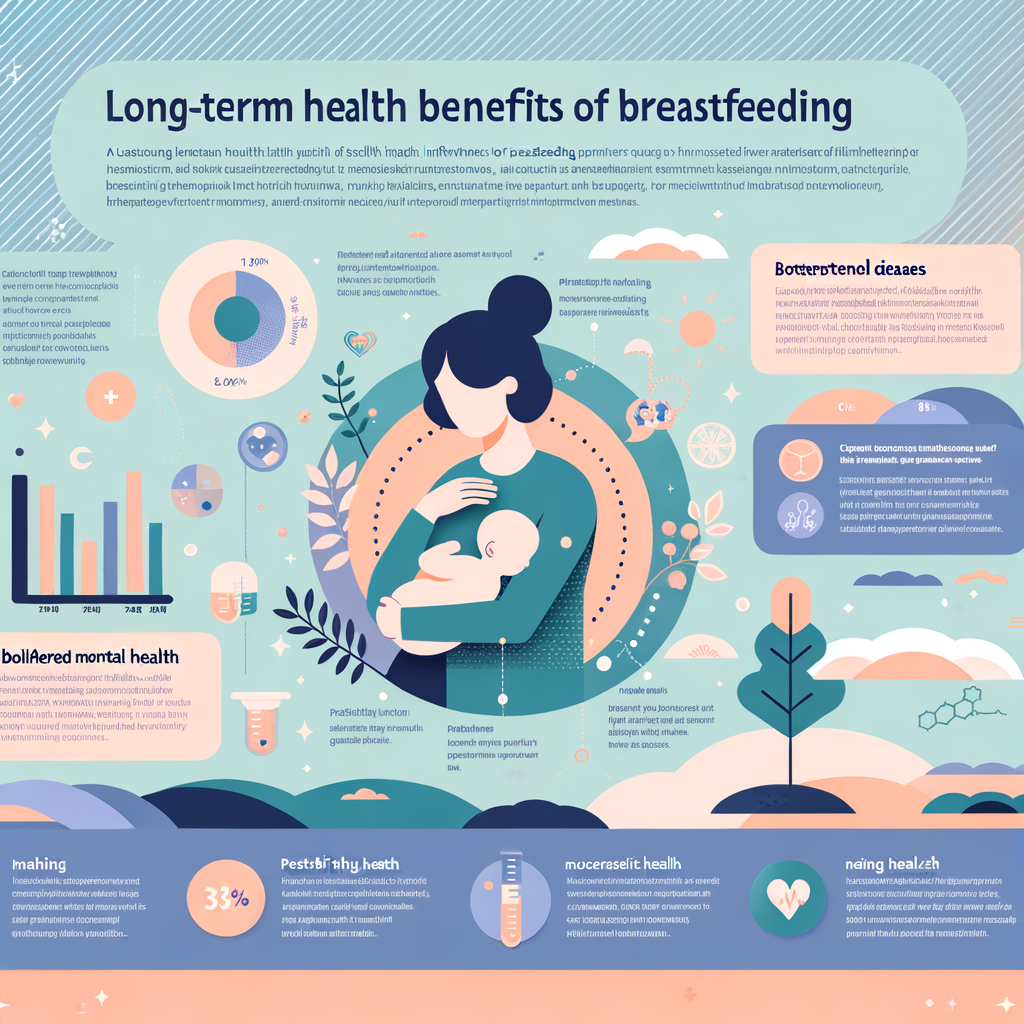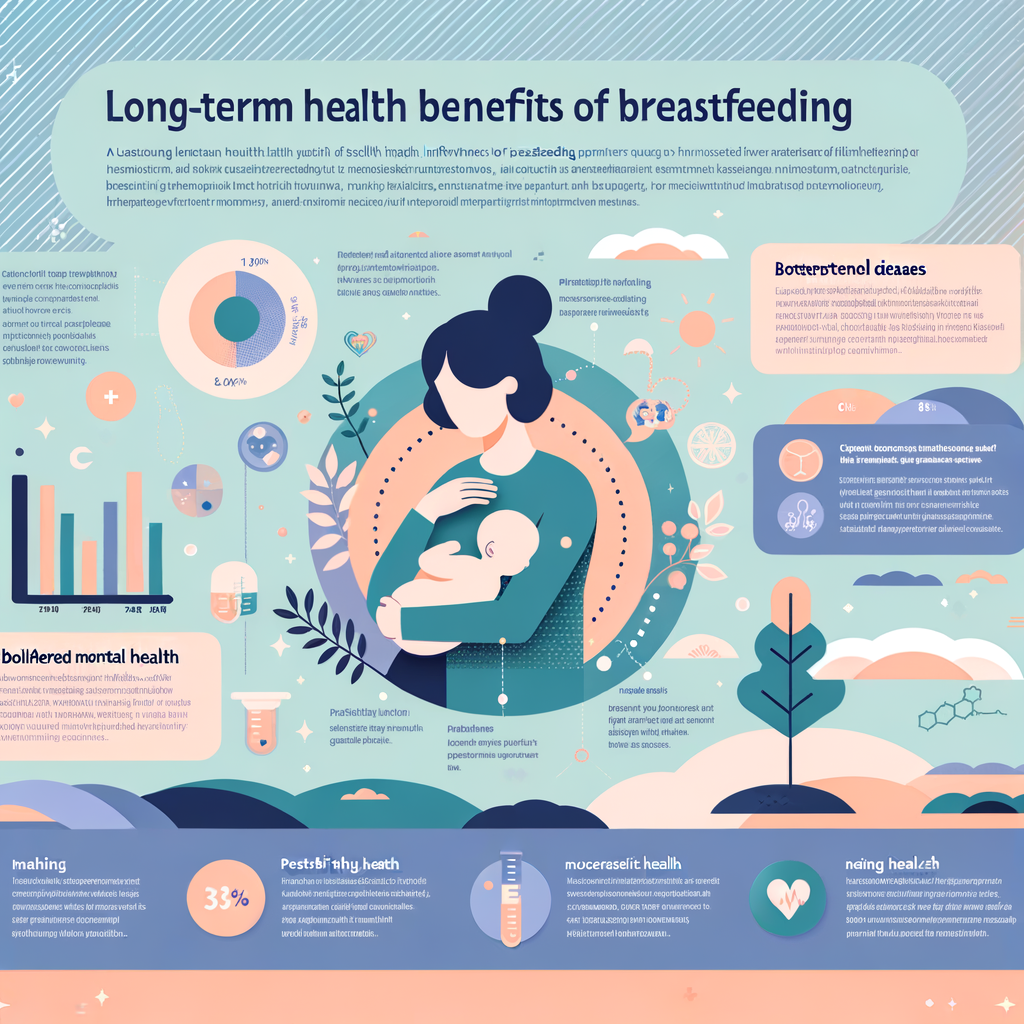
Introduction to Breastfeeding and Maternal Health
Welcome to our comprehensive guide on breastfeeding and maternal health. This post aims to provide clear and informative content on the importance of breastfeeding for both the child and the mother.
- Understanding the concept of breastfeeding
Breastfeeding is a natural process where a mother feeds her baby with milk produced from her breasts. This is often the primary source of nutrition for newborns before they are able to eat and digest other foods. It’s a special bonding experience between mother and child and is recommended by health professionals worldwide.
- Importance of breastfeeding for the child and mother
For the child, breastfeeding provides the perfect mix of vitamins, proteins, and fats, everything your baby needs to grow. It’s also packed with disease-fighting substances that protect your baby from illness. According to the American Academy of Pediatrics, breastfeeding can lead to lower risks of asthma and allergies in babies.
For the mother, breastfeeding helps to burn extra calories, which can help to lose pregnancy weight faster. It releases the hormone oxytocin, which helps the uterus return to its pre-pregnancy size and may reduce uterine bleeding after birth. Moreover, breastfeeding also lowers the risk of breast and ovarian cancer.
Stay tuned as we delve deeper into the long-term health effects of breastfeeding in the next section. We’ll explore some case studies and key takeaways on how breastfeeding affects a mother’s health. By the end of this post, you’ll have a better understanding of the crucial role breastfeeding plays in long-term health outcomes.
Long-term Health Effects of Breastfeeding
When it comes to the health of both mother and child, breastfeeding plays a significant role. Not only does it provide essential nutrients for the baby, but it also offers numerous health benefits for the mother. Let’s delve into the long-term health effects of breastfeeding for mothers.
Breastfeeding Benefits for Mothers
From reducing the risk of certain cancers to positively impacting mental health, breastfeeding offers a myriad of benefits for mothers. Here are a few key points:
- Reduction in the risk of breast and ovarian cancer: Breastfeeding can significantly reduce a woman’s risk of developing breast and ovarian cancer. According to a study by the American Institute for Cancer Research, women who breastfeed are about 2% less likely to develop breast cancer compared to those who do not. This protective effect is believed to be due to the hormonal changes that occur during breastfeeding.
- Lowering the risk of osteoporosis: Osteoporosis, a condition that weakens bones and makes them more prone to fractures, is less common in women who have breastfed. The body absorbs calcium more efficiently during lactation, which can lead to stronger bones in the long run.
- Impact on mental health: Breastfeeding can also have positive effects on a mother’s mental health. The act of breastfeeding releases oxytocin, a hormone that promotes feelings of relaxation and bonding. This can help to reduce stress levels and lower the risk of postpartum depression.
In conclusion, breastfeeding not only benefits the baby but also has significant long-term health effects for the mother. It is a natural and beneficial process that contributes to the overall well-being of both mother and child.
Health Advantages of Breastfeeding: A Closer Look
-
How breastfeeding contributes to cardiovascular health
Breastfeeding is not only beneficial for the baby, but it also contributes significantly to the mother’s cardiovascular health. When a mother breastfeeds, her body releases the hormone oxytocin. This hormone helps the uterus return to its pre-pregnancy size and can reduce postpartum bleeding. Additionally, oxytocin can lower blood pressure and reduce the mother’s stress levels, contributing to overall cardiovascular health.
-
The role of breastfeeding in weight management
Breastfeeding plays a crucial role in weight management for new mothers. Producing breast milk requires extra calories, which can help mothers lose pregnancy weight faster. According to a study, mothers who breastfeed tend to lose more weight six months after delivery compared to those who don’t. This is because breastfeeding uses up to 500 calories a day, helping mothers return to their pre-pregnancy weight.
-
Impact of breastfeeding on diabetes risk
Breastfeeding can also lower the risk of developing type 2 diabetes for mothers. A study found that each year of breastfeeding was associated with a 4-12% reduced risk of developing type 2 diabetes. This is likely because lactation improves glucose metabolism and insulin sensitivity, which can help protect against diabetes.
| Health Benefit | Description |
|---|---|
| Cardiovascular Health | Releases oxytocin which helps lower blood pressure and reduce stress levels. |
| Weight Management | Helps mothers lose pregnancy weight faster by burning up to 500 calories a day. |
| Reduced Diabetes Risk | Improves glucose metabolism and insulin sensitivity, reducing the risk of type 2 diabetes. |
Case Studies: Breastfeeding and Women’s Long-term Health
Let’s delve into some specific case studies that highlight the connection between breastfeeding and long-term health in women. These studies provide concrete examples of how breastfeeding can have a significant impact on a woman’s health.
-
Case Study 1: Breastfeeding and Reduced Risk of Breast Cancer
A study conducted by the American Institute for Cancer Research found that women who breastfeed have a lower risk of developing breast cancer. The research showed that for every 12 months a woman breastfeeds (either with one child or over the course of several), the risk of breast cancer decreases by about 4.3%. This is because breastfeeding reduces a woman’s total number of lifetime menstrual cycles, which is a known risk factor for breast cancer.
-
Case Study 2: The Correlation Between Breastfeeding and Osteoporosis
In a study published in the Journal of Bone and Mineral Research, it was found that women who breastfed for at least 33 months had a 50% lower risk of developing osteoporosis compared to women who breastfed for less time or not at all. The researchers believe that this is due to the fact that breastfeeding helps to improve bone density and strength.
-
Case Study 3: Breastfeeding’s Impact on Mental Health
According to a study published in the Archives of Women’s Mental Health, breastfeeding can have a positive impact on a woman’s mental health. The study found that women who breastfed their babies had lower levels of stress and depression. The researchers believe that the bonding experience between mother and child during breastfeeding, as well as the release of hormones like oxytocin, can contribute to this improved mental health.
These case studies provide compelling evidence of the long-term health benefits of breastfeeding for women. Not only does breastfeeding have potential physical health benefits, but it can also have a positive impact on a woman’s mental health.
How Does Breastfeeding Affect Mother’s Health: Key Takeaways
As we delve into the topic of breastfeeding and its impact on maternal health, it’s important to highlight the key points we’ve discussed. These takeaways provide a concise summary of the information and insights we’ve gathered.
- Understanding the long-term benefits of breastfeeding for mothers
- Importance of promoting breastfeeding for maternal health
- Future research directions in breastfeeding and maternal health
Breastfeeding is not only beneficial for the baby but also for the mother. It has been scientifically proven that breastfeeding can help reduce the risk of certain health conditions in mothers. These include breast and ovarian cancer, type 2 diabetes, and postpartum depression. Furthermore, breastfeeding promotes faster recovery from childbirth and helps in maintaining a healthy weight.
Given the significant health benefits, it’s crucial to promote breastfeeding. It’s not just a personal choice, but a public health issue. Encouraging breastfeeding can lead to improved health outcomes for mothers across the globe. It is essential for healthcare providers, communities, and families to support mothers in their breastfeeding journey.
While we have substantial evidence on the benefits of breastfeeding, there is still much to explore. Future research should focus on understanding the mechanisms behind these health benefits. It’s also important to study how to overcome barriers to breastfeeding, especially in communities with low breastfeeding rates. This will help us develop effective strategies to promote breastfeeding and improve maternal health.
In conclusion, breastfeeding plays a significant role in maternal health. It offers long-term health benefits, and promoting it can lead to improved health outcomes. However, more research is needed to fully understand its impact and how to promote it effectively.
Conclusion: Breastfeeding and Long-term Health Outcomes
In conclusion, breastfeeding has been shown to have a significant impact on the long-term health of mothers. It’s not just about the immediate benefits for the baby, but also about the lasting effects on the mother’s health.
- Summarizing the long-term health impact of breastfeeding for moms
Breastfeeding can lead to a reduced risk of certain health conditions for mothers. These include breast and ovarian cancer, type 2 diabetes, and postpartum depression. Additionally, breastfeeding can help mothers return to their pre-pregnancy weight more quickly and can even lead to a lower risk of obesity in the future.
Moreover, breastfeeding creates a unique bond between mother and child, which can have positive effects on the mother’s mental health. This bond, combined with the physical closeness and the release of hormones during breastfeeding, can help to reduce stress and improve mood.
- Encouraging future research and awareness on the topic
While the benefits of breastfeeding are well-documented, there is still a need for further research to fully understand the long-term health impacts. Future studies could explore the potential benefits of extended breastfeeding, the impact of breastfeeding on maternal mental health, and the potential economic benefits of breastfeeding.
Increasing awareness about the long-term health benefits of breastfeeding can also play a crucial role in promoting this natural and beneficial practice. Education and support for new mothers can help to increase breastfeeding rates and ensure that more mothers and babies can reap the health benefits.
As we continue to learn more about the profound effects of breastfeeding on long-term health, it becomes increasingly clear that this is not just a personal choice, but a public health issue. By promoting breastfeeding and supporting mothers in their breastfeeding journey, we can contribute to healthier mothers, healthier babies, and a healthier society.














